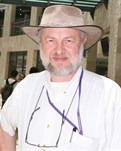
Prof. Joseph Kost D.Sc
Joseph Kost D.Sc. is University Distinguished Professor. He holds The Abraham and Bessie Zacks Chair in Biomedical Engineering, and was the Dean of the Faculty of Engineering Sciences at Ben-Gurion University of the Negev (BGU). Kost completed his undergraduate and graduate degrees in Chemical Engineering at the Technion, Israel Institute of Technology, before earning a doctorate in Biomedical Engineering at the same institution. Later he also earned a M.B.A. fromBGU’s Department of Management. He is a Fellow of the American Institute for Medical and Biological Engineering, a Foreign Member of the United States National Academy of Engineering (NAE), an Honorary Fellow of the Israel Institute of Chemical Engineers, a Member of the Controlled Release Society College of Fellows, and a Member of the Israel Academy of Sciences and Humanities.
Prof. Alfred M. Bruckstein
The Mathematics of Multi-A(ge)nt Interactions
or
How to Coordinate a Swarm of Simple Robots
An ant colony is a marvel of cooperation and coordinated, purposeful work carried out by simple a(ge)nts with very limited capabilities. Ants do not have GPS systems, have no compasses nor odometers, do not use laser range finders , nor do they have good memories or extraordinary computational resources, and employ no sophisticated long-range sensing or communication equipment. Yet they are ruling the earth, by numbers and by resilience, and by some evolution-developed local response algorithms, that rely on pheromone-mediated myopic interactions. The environment becomes a huge, shared resource covered with "chemical memory" signals.
The paradigm of swarm robotics is an attempt to mimic this phenomenal success of nature. In the attempt to analyze the capabilities of colonies of small and limited robots to perform a variety of tasks one encounters formidable mathematical difficulties. The direct problem of analyzing the emergent global behavior that results from a set of rules of local interaction is tractable in a few interesting cases, like for example in gathering and region covering or patrolling missions. The inverse problem of deriving local rules of behavior, based on the ant-like robots' limited sensing and communication capabilities, is far less approachable. Several examples illustrating the mathematical tools available for analyzing the behavior of swarms of myopic agents will be discussed in my presentation.
Dr. Uri Roll
Uri is a newly appointed senior lecturer at the Mitrani Department of Desert Ecology, The Jacob Blaustein Institutes for Desert Research, based in the Sede-Boqer Campus, of the Ben-Gurion  University. He received his bachelor’s in life sciences and M.Sc. in ecology and the environment (under the Supervision of Prof. Tamar Dayan & Prof. Daniel Simberloff) from the Tel-Aviv University. He conducted his Ph.D. in the Biomathematics Unit, Department of Zoology, of the Tel-Aviv University under the supervision of Prof. Lewi Stone. He conducted his post-doc research at the School of Geography and the Environment, and the Department of Zoology at the University of Oxford.
University. He received his bachelor’s in life sciences and M.Sc. in ecology and the environment (under the Supervision of Prof. Tamar Dayan & Prof. Daniel Simberloff) from the Tel-Aviv University. He conducted his Ph.D. in the Biomathematics Unit, Department of Zoology, of the Tel-Aviv University under the supervision of Prof. Lewi Stone. He conducted his post-doc research at the School of Geography and the Environment, and the Department of Zoology at the University of Oxford.
Uri is interested in the intricate interactions humans have with nature – how they affect it, and are affected and interact with it. To explore these patterns he uses theoretical & statistical models, the analysis of data at scales ranging from the local to the global, as well as data collected in the field on various organisms. This is done using an array of approaches from purely theoretic perspectives all the way to studies linked to on-the-ground implementation of conservation action. He is also interested in the arrangement and organization of natural phenomena in space at different scales.





